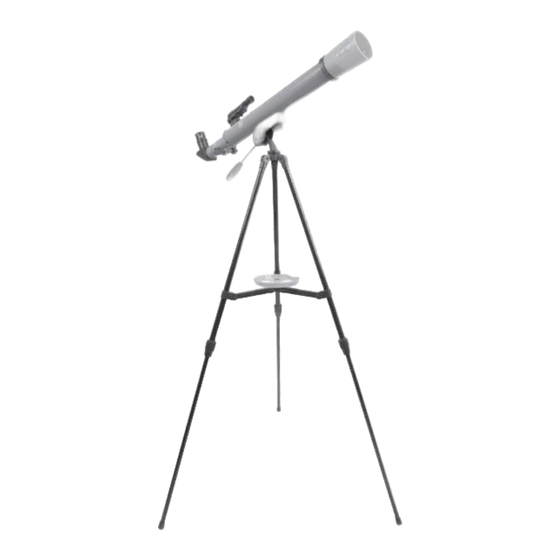- ページ 6
望遠鏡 Discovery Telecom 60mm Advanced TelescopeのPDF 取扱説明書をオンラインで閲覧またはダウンロードできます。Discovery Telecom 60mm Advanced Telescope 13 ページ。 Space exploration gear

INSTRUCTION MANUAL
TELESCOPE TERMS TO KNOW:
Diagonal: A mirror that deflects the ray of light 90 degrees.
With a horizontal telescope tube, this device deflects the light upwards so
that you can comfortably observe by looking downwards into the eyepiece.
The image in a diagonal mirror appears upright, but rotated around its
vertical axis (mirror image).
Focal length: Everything that magnifies an object via an optic lens has a
certain focal length. The focal length is the length of the path the light travels
from the surface of the lens to its focal point. The focal point is also referred
to as the focus. In focus, the image is clear. In the case of a telescope, the
focal length of the telescope tube and the eyepieces are used to determine
magnification.
Lens: The lens turns the light that falls on it around in such a way so that
the light gives a clear image in the focal point after it has traveled a certain
distance (focal length).
Eyepiece: An eyepiece is a system made for your eye and comprised of one
or more lenses. In an eyepiece, the clear image that is generated in the focal
point of a lens is captured and magnified still more.
Magnification: The magnification corresponds to the difference between
observation with the naked eye and observation through a magnifying device
like a telescope. If a telescope configuration has a magnification of 30x, then an
object viewed through the telescope will appear 30 times larger than it would
with the naked eye. To calculate the magnification of your telescope setup,
divide the focal length of the telescope tube by the focal length of the eyepiece.
6
